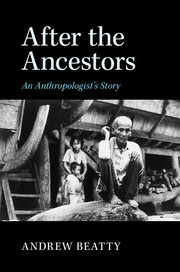Book contents
- Frontmatter
- Epigraph
- Contents
- List of illustrations
- Preface
- People
- Map
- Prologue
- 1 The statue
- 2 House key
- 3 Among women
- 4 Blood brothers
- 5 Daggers and debutants
- 6 Stormy Sunday
- 7 Three things that matter
- 8 The making of great men
- 9 A game of chess
- 10 Cholera song
- 11 Progress
- 12 Brothers and strangers
- 13 Exile and return
- 14 Field work
- 15 The chicken's neck
- 16 Good deaths and bad deaths
- 17 First family
- 18 Blessing
- 19 Half an egg
- 20 Waiting
- 21 Death of a chief
- 22 Ama Jonah at bay
- 23 Unravelling
- 24 The ethnographer and his double
- Epilogue
- Index
Prologue
Published online by Cambridge University Press: 05 March 2015
- Frontmatter
- Epigraph
- Contents
- List of illustrations
- Preface
- People
- Map
- Prologue
- 1 The statue
- 2 House key
- 3 Among women
- 4 Blood brothers
- 5 Daggers and debutants
- 6 Stormy Sunday
- 7 Three things that matter
- 8 The making of great men
- 9 A game of chess
- 10 Cholera song
- 11 Progress
- 12 Brothers and strangers
- 13 Exile and return
- 14 Field work
- 15 The chicken's neck
- 16 Good deaths and bad deaths
- 17 First family
- 18 Blessing
- 19 Half an egg
- 20 Waiting
- 21 Death of a chief
- 22 Ama Jonah at bay
- 23 Unravelling
- 24 The ethnographer and his double
- Epilogue
- Index
Summary
The people of Nias in the west of Indonesia have no memory of how they came to populate their island, no legends of colonization, no distant homeland. Like Adam and Eve they were there at the beginning of things, alone in the world. They call themselves Ono Niha, Children of Men, and their island Tanö Niha, Land of Men.
What, then, was the origin of humans? There are fragments of a creation story. They tell of a nameless being adrift in the void, impelled by loneliness to bring forth from her body; of how she scraped the dirt from her skin, beat it into shape and breathed on it; and they tell of her botched first efforts and tears of rage. A glimpse of the cosmic artificer: rough beast, scratching and weeping in the sky-wilderness.
The first human, a round androgynous child, split in two at the source of a river. The twin halves rolled apart and grew into Man and Woman. When they met and mated, innocent of their origin, they begat the Nias race, the Niha. The myth (now forgotten) recalls Plato's fable of a round primeval being whom the gods divide in two. Perhaps the meaning is similar: “Each of us when separated, having one side only, like a flat fish, is but the indenture of a man, and he is always looking for his other half.” At the source of things is wholeness, a sacred but sterile completeness. Life requires division. We separate, find our doubles, reproduce; but a nostalgia for the whole remains.
Later, better-remembered stories – the coded record of migrations or landfalls – tell of descent to earth from a heavenly village some thirty generations ago. Only one of the nine sons of Sirao could succeed his father as heavenly ruler: whoever could perch like a cock on the point of a spear. The youngest son succeeds and the others are lowered down at high spots around the island – each tipping the balance slightly “as though the land pivoted on scales”.
- Type
- Chapter
- Information
- After the AncestorsAn Anthropologist's Story, pp. 1 - 4Publisher: Cambridge University PressPrint publication year: 2015



